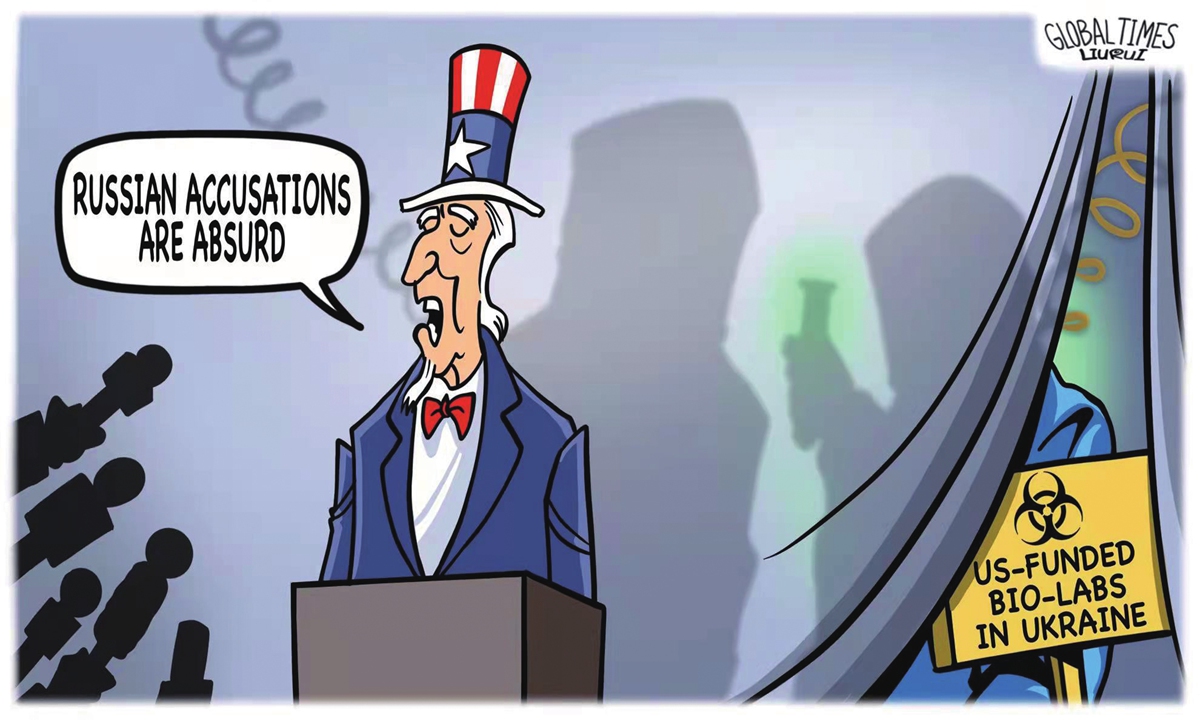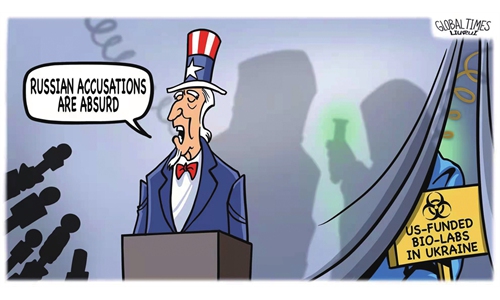Access to suspicious US biolabs in Ukraine should be organized: Russian biotechnologist

Mixed messages Illustration: Liu Rui/GT
Editors' Note:
More and more secrets about US-funded biolabs in Ukraine have come to light amid the Russia-Ukraine conflict. Apart from Ukraine, the US has funded laboratories in many other post-Soviet states. What are these biolabs studying? Is it possible that the US is creating genetic weapons that target specific people? Russian biotechnologist Ilya Dukhovlinov (Dukhovlinov) talked about these issues with Global Times (GT) reporter Xia Wenxin in an email interview.
GT: You mentioned in a recent interview with Russian media outlet Vzglyad that you had worked at the National Institutes of Health in the US, where you learned about a research project to study genetic characteristics of different peoples. Can you tell us more about this project? What is the US trying to accomplish?
Dukhovlinov: In the United States, it was a very large program that studied the relationship between human genetic factors and the course of various diseases. Countries such as Russia, India, and European countries and African countries were studied. In each country, a connection was established with a local institute that was engaged in genetics. Then a lot of money (several million dollars) was paid to local scientists, and a center was created for collecting samples of genetic information from the local population. Then all samples were sent to the US, where they were continued to be stored. At least 30,000 images and up to 100,000 samples were collected from each country. All this was formalized in the form of grants and scientific work. This was presented as a study of the evolution of mankind in relation to various infections. Outwardly, it looked like a fundamental scientific topic. But in fact, it was a study of the genetic difference between different peoples and made it clear which genetic groups are most susceptible to viruses.
GT: As far as you know, has this research found anything about Russians and Chinese? For example, which pathogens are Russians and Chinese less resistant to, according to the research?
Dukhovlinov: Yes, of course, a lot of data was found on Russia and China.
The selection of candidates will include gene encoding proteins that metabolize or transport toxins, biotransformation genes, immune response genes (ligands and receptors for cytokines and chemokines, HLA, and KIR), DNA repair gene, tumor suppressor genes, genes encoding proteins used by viruses for replication, and other genes involved in the oncogenic pathways.
As you can see, these are not only genes that are associated with the course of the disease, but also genes responsible for the transport of toxins and the development of cancer.
In general, huge amounts of data were obtained during these studies. I know them only partially, but as a scientist I understand that this is very powerful and important information.
GT: Do you think that the US is now capable of creating genetic biological weapons against citizens of specific countries? In your opinion, how would the US use such a weapon if developed? How harmful would it be?
Dukhovlinov: Of course, the creation of such weapons is possible. These can also be viruses with embedded genome editing systems and even harmless at first glance pathogens, but genetically modified. For ethical reasons, I do not want to describe how it is best to do it, because I am against biological weapons. We must join forces to establish scientific centers to develop systems for the detection and protection against biological weapons. It is quite possible to create systems for the prompt detection of foreign genetic information in the air or blood of a person and, accordingly, to develop methods of neutralization.
GT: Back in 2017, Russian President Vladimir Putin and other top Russian officials warned that foreign agents were collecting DNA samples from Russians of different ethnicities and sending the data abroad for scientific analysis. Some suggested biodata could be used in US biological warfare research. Did Russia take any precautions in response? To your knowledge, is such DNA collection still ongoing?
Dukhovlinov: I hope that the collection of these data in this form does not continue. Among my colleagues and scientists known to me, no one does this. Russia has strictly limited the circulation of biological samples. Border control systems have been improved. Just taking out a test tube with something is almost impossible now, and this is good. This was decided at the organizational and legislative levels.
GT: Are US biological laboratories in countries surrounding Russia, such as Ukraine and Georgia, involved in the above-mentioned genetic characteristics research or biodata collection? If not, what are the main areas of research conducted by US biological laboratories in these countries?
Dukhovlinov: Yes, American scientists conducted full-scale genetic research in Ukraine, including the genetic features of the Ukrainian population, most recently in 2020. Also, the United States and a number of European countries organized special exercises in Ukraine related to biological safety.
These laboratories were involved in the study of pathogens transmitted by various pathways.
At the same time, it must be understood that virology and epidemiology are very important and useful sciences. Research in this area can be peaceful, but it can also be used against humanity. It's like an atom. It can be peaceful and military.
GT: The Russian Defence Ministry has recently announced that the US-funded biological labs located in Ukraine were conducting experiments with bat coronavirus samples. But the US responded simply by saying that Russia was spreading disinformation. What kind of information do you think the US should reveal to the international community to dispel the suspicions of the countries involved?
Dukhovlinov: In order to dispel suspicions about this topic, access to the suspicious laboratories of independent scientists should be organized. All equipment stores information about what was done on it. You need to see the Sequencing Files, as well as study the logs and the cryo system. Several professionals will understand whether it is true or not (about bats and COVID) in a few hours. The openness of science is the most important factor in its safety. If you do nothing wrong, then demonstrating and discussing scientific data with other colleagues from other countries - including verification - is normal.

